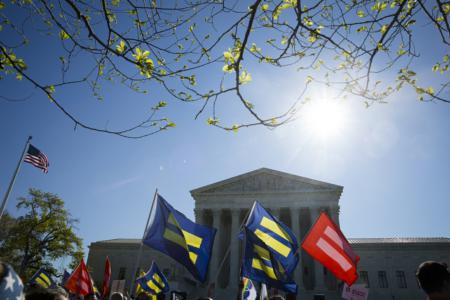The Pope and America
When Pope Francis comes to the United States in late September, chances are good that he will arrive in the middle of a bitter, highly politicized national debate on same-sex marriage and religious liberty.
That suggests several large questions for the papal visit. Should the Pope say anything about these high-voltage issues? Given the circumstances, how could he responsibly fail to do that? But if he does say something, what should it be?
Note that this trip will take place just three months after a Supreme Court decision expected to expand the reach of same-sex marriage in the U.S. Although it would be rash to predict exactly what the court will say in late June, it's likely to do what so far it has stopped short of doing--extend the mantle of constitutional protection to gay marriage everywhere in the country,
If so, conflict will intensify over whether individuals and groups with conscientious objections to cooperating with same-sex marriage will also receive legal protection. The blowback lately over a religious freedom measure in Indiana spotlighted the ugly fact that many Americans--by no means only self-identified civil libertarians and gay rights activists either--see no contradiction in advancing the new regime of gay marriage while trampling on the religious rights of objectors.
This, then, is the de facto situation Pope Francis will confront upon arriving in America on a trip certain to generate a vast amount of media coverage and commentary. It's hardly likely this outspoken pontiff can avoid saying something about what's happening, even supposing he wanted to do that.
He will have plenty of opportunities. The occasion of his visit is a church-sponsored international family meeting in Philadelphia where he will preside September 26 and 27. While there, he will celebrate a public Mass that's expected to draw a huge crowd. After his arrival in Washington four days earlier and before heading to Philadelphia, he will have stopped by the White House to visit President Obama, addressed a joint session of Congress--the first time a pope has done that--and spoken to the United Nations General Assembly in New York. (En route to the U.S., he will make a brief stop in Cuba, where he will encourage further Cuban-U.S. reconciliation.)
Francis has spoken out often in opposition to same-sex marriage and in support of religious liberty. There's no doubt about that. But his U.S. trip comes just days before he plunges into a world Synod of Bishops assembly back in Rome at which one hotly debated topic is likely to be--as it also was at the Synod of Bishops that took place last fall--whether and how the Church should make new friendly gestures to homosexuals.
Not only that--on December 8, the Pope will formally launch a year-long Jubilee of Mercy. This is a church-wide observance decreed by Francis with the aim of spotlighting and promoting a Christian quality close to his heart and central to his vision for the Church. The LGBT community is clearly among the groups that he has in mind in this regard.
The controversy likely to be raging in the U.S. in September makes it desirable that Francis set out a strong case for religious liberty and uphold man-woman marriage in his public remarks. Any hint of backing down would be a serious blow to the cause. But his own commitments, combined with the overheated political scene he will find here, create a fine line for him to walk. Say a prayer he pulls it off.
- Russell Shaw is the author of more than twenty books. He is a consultor of the Pontifical Council for Social Communications and served as communications director for the U.S. Bishops.



















